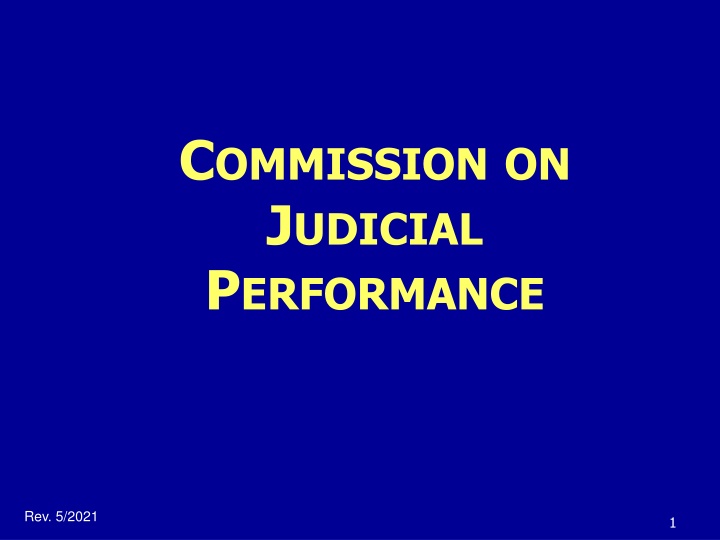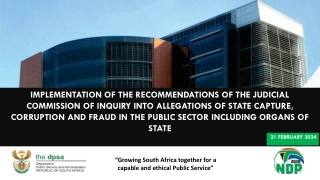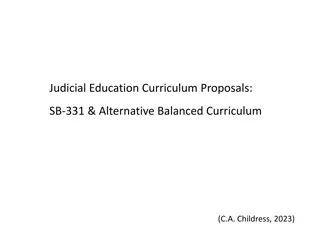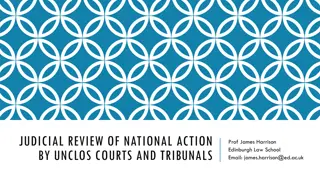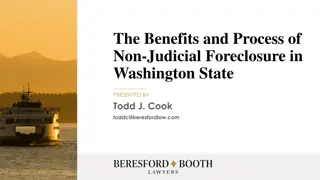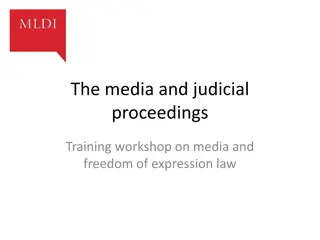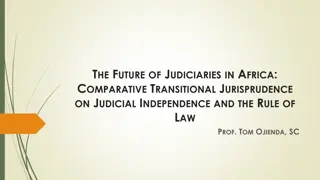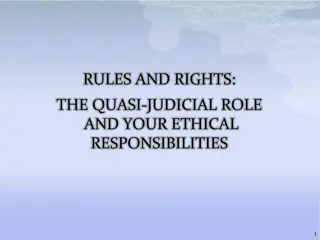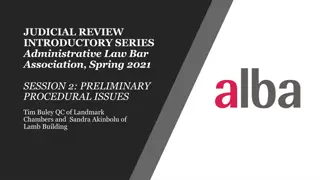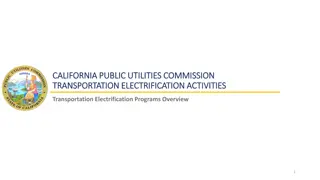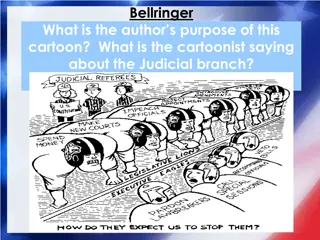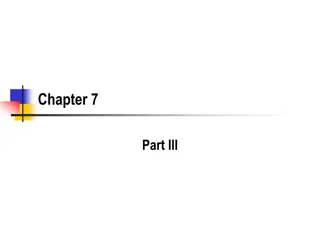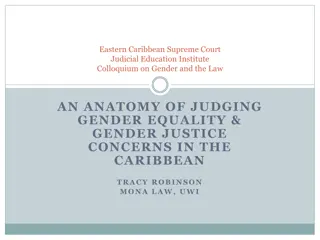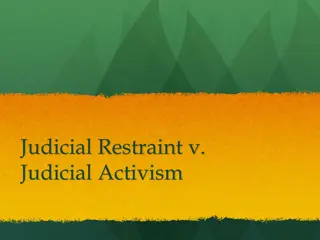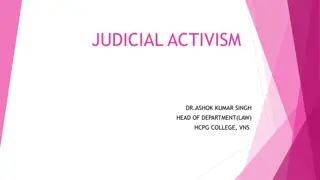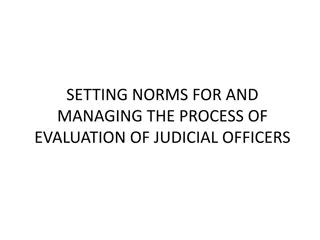California Commission on Judicial Performance Overview
The California Commission on Judicial Performance, established as an independent state agency in 1960, is responsible for investigating complaints of judicial misconduct and incapacity. It aims to protect the public, enforce rigorous standards of judicial conduct, and maintain confidence in the integrity of the judicial system. The commission, composed of eleven members, including public members, judicial members, and attorneys, follows specific procedures for handling complaints. Appointments to the commission are made by various authorities, such as the Supreme Court and the Governor. Its mandate focuses on upholding judicial integrity and public trust.
Download Presentation

Please find below an Image/Link to download the presentation.
The content on the website is provided AS IS for your information and personal use only. It may not be sold, licensed, or shared on other websites without obtaining consent from the author.If you encounter any issues during the download, it is possible that the publisher has removed the file from their server.
You are allowed to download the files provided on this website for personal or commercial use, subject to the condition that they are used lawfully. All files are the property of their respective owners.
The content on the website is provided AS IS for your information and personal use only. It may not be sold, licensed, or shared on other websites without obtaining consent from the author.
E N D
Presentation Transcript
COMMISSIONON JUDICIAL PERFORMANCE Rev. 5/2021 1
AUTHORITY Commission established as an independent state agency by voter approval of an amendment to the California Constitution in 1960 2
AUTHORITY The commission does NOT: provide ethics opinions propose canons or amendments thereto discipline or regulate attorneys (including judges pro tem) 3
AUTHORITY Jurisdiction includes all active California judges and former judges for conduct that occurred when a judge (1,868 in 2020) Shared authority with local courts over commissioners and referees (250 in 2020) 4
AUTHORITY Responsible for investigating complaints of judicial misconduct and judicial incapacity, and for disciplining judges Judicial branch agency with independence from judicial branch 5
MANDATE The purpose of a commission disciplinary proceeding is not punishment, but rather the protection of the public, the enforcement of rigorous standards of judicial conduct, and the maintenance of public confidence in the integrity and independence of the judicial system. 6
COMPOSITION OF COMMISSION Eleven Members Six Public Members Three Judicial Members Two Attorneys 7
COMPOSITION OF COMMISSION Appointing Authorities Supreme Court 3 judicial members Governor 2 attorneys; 2 public members Assembly Speaker 2 public members Senate Rules 2 public members 8
PROCEDURES Complaints submitted online or by U.S. Mail or fax Review of Complaints: The commission votes to take action on every complaint. The majority are closed after initial review. 9
PROCEDURES If not closed at the initial review, the commission may authorize a staff inquiry or a preliminary investigation. 10
PROCEDURES Unless the commission decides to close the matter upon initial review or after an initial investigation, the judge will be informed by letter of the allegations and given an opportunity to respond. 11
PROCEDURES The letter to the judge includes specification of the allegations, including, to the extent possible, the date and the location of the alleged conduct, the name of the court case (if applicable), and the text of any alleged comments. 12
PROCEDURES After a staff inquiry, the commission may: close the complaint issue an advisory letter elevate to preliminary investigation 13
PROCEDURES After a preliminary investigation, the commission may: close the complaint issue an advisory letter defer investigation for a period of monitoring the judge s conduct allow mentoring give notice of tentative private or public admonishment institute formal proceedings 14
BURDEN OF PROOF The commission has the burden of proving allegations of misconduct by clear and convincing evidence. 15
ADVISORY LETTER Judge can: accept advisory letter request correction file writ petition with Supreme Court 16
PRIVATE ADMONISHMENT/PUBLIC ADMONISHMENT Judge gets notice of tentative admonishment 17
PRIVATE ADMONISHMENT/PUBLIC ADMONISHMENT Judge can: accept discipline request an appearance demand formal proceedings 18
APPEARANCE PROCEDURE must waive formal proceedings and review by the Supreme Court must request within 30 days must object in writing confidential 19
FORMAL PROCEEDINGS The judge is notified of the charges, receives discovery, and files an answer. A public evidentiary hearing is held before three special masters appointed by the Supreme Court. The Evidence Code applies. Parties submit briefs to special masters. The special masters submit a report with findings of fact and conclusions of law. 20
FORMAL PROCEEDINGS After receipt of the special masters report, parties file briefs to the commission, and there is an appearance before the commission. At the conclusion, the commission can impose any sanction including public censure and removal from office. Typically, only 2-3 cases per year go to formal proceedings. 21
CANONS PROHIBIT BIAS 3B(5): A judge shall perform judicial duties without bias or prejudice. Forbids sexual harassment or bias (or appearance thereof) based on race, sex, gender, gender identity or expression, religion, national origin, ethnicity, disability, age, sexual orientation, marital status, socioeconomic status, or political affiliation. 22
ACTIONS REFLECTING BIAS Comments about physical appearance of attorneys and court staff Use of social media to disparage people based on immigration status Making jokes about someone s accent Refusing to use a person s preferred pronouns 23
CJP Website https://cjp.ca.gov 24
